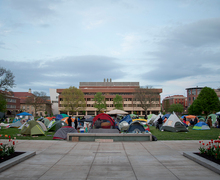Orchard uses past experiences to excel at defensive end for Utah
Courtesy of Utah Athletics
Nate Orchard (left) leads the NCAA with 16.5 sacks and comes from a background that made him grow up faster than a lot of college football players.
Nate Fakahafua walked up to the doorstep of the Orchard family’s house in an old, dirty basketball uniform with nowhere else to go.
His brother had just been evicted from his apartment, leaving him without a roof over his head. His mother had called Katherine Orchard before, asking if Nate could stay with her family. Katherine and her husband Dave Orchard — Nate’s basketball coach at the time — have five kids of their own in addition to a handful of others they had welcomed in before.
Katherine said no. But Nate, as a 6-foot-1 12-year-old, was undeterred.
“Are you here to stay?” Dave asked him. Nate said he was.
“He looked like he needed somewhere to be,” Katherine said. “So we just threw him in the shower, put some clean clothes on and that was it. He’s lived here ever since.”
For someone who was forced to grow up much faster than most 12-year-olds, Nate, who is black, moved in with an all-white family in all-white neighborhood, used sports as his outlet and took their last name a year ago. He committed to the University of Utah as a sophomore in high school and six years later, he’s a senior defensive end for the Utes leading college football with 16.5 sacks.
As a senior, Nate Orchard commands respect from his teammates as a captain, just as Katherine and Dave demanded the same from him. Chores were done on Saturday mornings in the Orchard house and a bedtime wasn’t an option. The structure and expectations led him to Utah where he’s realized his football dream.
“It’s amazing to see how he’s taken his life in his own hands and made it what he wanted it to be,” Maegan Orchard, Nate’s wife, said. “It could have gone one way or the other and he worked his butt off to make it the way he wanted it to be.”
Nate typically leaves the house each morning between 6 and 8 a.m., and tries to be home by 10 p.m. He begs Maegan to keep their daughter, Katherine, up late enough so he can see her. Katherine’s named after the woman who took Nate in when it looked like he didn’t have a home.
His concept of family comes from the Orchards, who took him to the beach for the first time and taught him what sunscreen was. He couldn’t muster more than a doggy paddle in the ocean and got caught in a rip tide. He was forced to leave the beach in an ambulance after being rescued. Katherine and Dave paid the medical bill in cash because they didn’t have insurance for him.
That spurred the Orchards to start the process of making Nate their legal son.
Now he loves being a father and, with all the time spent away from his home each day, he’s become a similar figure for Utah’s younger players. He’s taken freshmen with him to play basketball and barbecue to make them feel at home, something that took him 12 years to find.
“When these younger guys came in, I wanted to show them the ropes right away,” Nate said. “I want them to know they’re not here alone and there’s a lot of loving and caring people around here.”
It’s his paternal instincts that led Utah head coach Kyle Whittingham to distinguish Nate as the “leader of leaders” on the team. Nate calls player-only meetings on Thursday mornings by sending out team-wide texts.
He stands in front of the team with his fellow captains and runs down what everyone needs to do to prepare for the upcoming game, and declares where the team needs to be mentally to succeed. He’s revered by his teammates for his ability to lead and manage himself, something he does better than guys who don’t necessarily have as many responsibilities.
“It’s almost like he’s been a grown man since he got here as a freshmen,” fellow captain and defensive back Brian Blechen said. “Even guys who don’t have a wife or kids at home still look up to him as their role model.”
It’s all been embedded into Nate since he was a filled-out, tight-lipped 12-year-old walking up to the Orchard’s front door.
It’s his complicated upbringing that allows him to see life through a different lens today, a perspective he’s unbelievably grateful for.
“It was a difficult situation for me growing up,” Nate said. “But I wouldn’t change it for the world because it’s made me the man I am today, the father I want to be.
“It’s the reason I love the game so much.”
Published on November 19, 2014 at 12:10 am
Contact Connor: [email protected] | @connorgrossman




